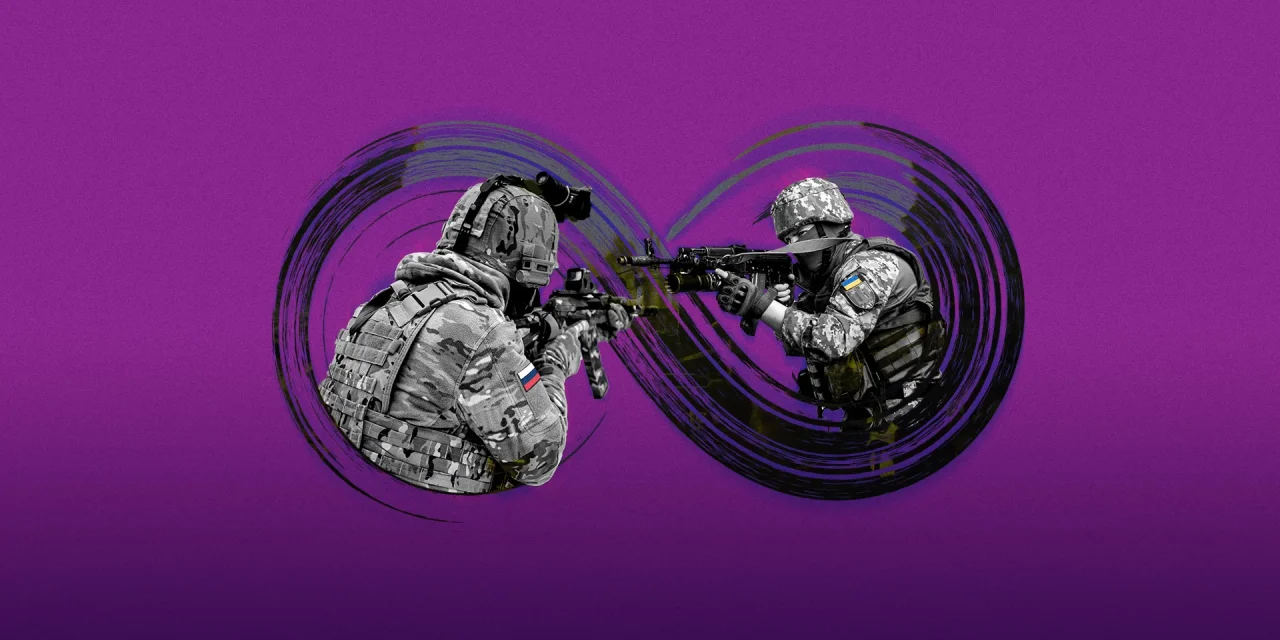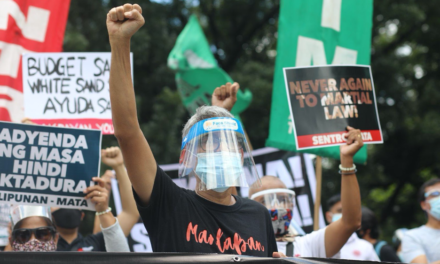An earlier version of this article was published on Rappler at the link here.
The war in Ukraine is a conflict that has inflicted terrible loss of lives on both sides. Some 100,000 Ukrainians are said to have been killed, most of them combatants but also hundreds of civilians. 200,000 Russians are also estimated to have died. All of them in the one year since Russia’s invasion began in February 2022. It has been reported that the average life span of a Ukrainian soldier deployed to the frontlines is four hours. Meanwhile, some eight million refugees have fled Ukraine, and millions more have been internally displaced.
The Ukraine War’s Complex Origins
In the western press, the image evoked by Putin’s invasion of Ukraine in Feb 2022 is that of Hitler marching into Czechoslovakia in 1938. The reality is much more complex than that.
First of all, Ukraine and Russia were once part of the same state, and when the Soviet Union collapsed in 1991, they went their separate ways. However, being part of the Soviet Union for over 70 years and of the Russian Empire before the October 1917 Revolution, there have been very close cultural, linguistic, and ethnic ties between Russians and Ukrainians, with significant numbers of Russian speakers in those parts of Ukraine that adjoin Russia. Russian is the most common first language in the Donbass and Crimea regions of Ukraine and the city of Kharkiv, as well as being the predominant language in large cities in the eastern and southern portions of the country. According to one survey, Russian is used at home by 43–46% of the population of the country, a similar proportion to those that use Ukrainian at home.
Secondly, unlike Hitler’s moves in Czechoslovakia in 1938, Putin’s actions in Ukraine cannot be said to be unprovoked. Perhaps the key event that influenced Putin’s controversial annexationist moves was the so-called Euromaidan Uprising in 2014, which overthrew President Viktor Yanukovich, a Putin ally. Ukrainian fascists played a prominent role in the Euromaidan events, and the Russian government said that they were backed covertly by western governments.
Shortly after the Euromaidan events, Russia invaded and annexed Crimea in 2013-2014, with Putin saying that this move was justified by the dangers posed by the new Ukrainian regime to the ethnic Russian majority in Crimea. Thereafter, Russian supported separatist movements in the Donbass region in southeastern Ukraine where there was large numbers of ethnic Russians and Russian speakers.
The Role of NATO Expansion
A major concern of Putin and his predecessors was the eastward expansion of the European Union and the North Atlantic Treaty Organization. When the Soviet Bloc fell apart in 1991-92, there were assurances made to the Russians that NATO would not expand eastwards. As then US Secretary of State James Baker told then Soviet leader Mikhail Gorbachev in Feb 1990, “there would be no extension of NATO’s jurisdiction for forces of NATO one inch to the East.” The succeeding US administrations and its allies, however, disregarded concerns and warnings from Russia that its security would be imperiled by NATO’s eastward expansion. Not only were new members from the old Warsaw Pact (the old military alliance of Soviet Bloc countries) admitted but NATO announced at its summit in Bucharest in 2008 that Georgia and Ukraine would soon join the organization. Shortly after that announcement, Russia invaded Georgia–like Ukraine a former part of the Soviet Union–underlining Russia’s determination that former members of the Soviet Union should not be allowed into NATO.
These Russian concerns, however, went unheeded.
As the Council of Foreign Relations, a forum close to the US government, describes it, “Despite remaining a nonmember, Ukraine grew its ties with NATO in the years leading up to the 2022 invasion. Ukraine held annual military exercises with the alliance and, in 2020, became one of just six enhanced security partners, a special status for the bloc’s close nonmember allies. Moreover, Kyiv affirmed its goal to eventually gain full NATO membership…In the weeks leading up to its invasion, Russia made several major security demands of the United States and NATO, including that they cease expanding the alliance, seek Russian consent fort certain NATO deployments, and remove US nuclear weapons from Europe. Alliance leaders responded that they were open to new diplomacy but were unwilling to discuss shutting NATO’s doors to new members.” (Council on Foreign Relations, “Ukraine: Conflict at the Crossroads of Europe,” Feb 14, 2023)
In sum, Putin’s invasion of Ukraine was a violation of international law, but it was triggered by Russian fears of the negative geopolitical consequences for Russia of Ukraine’s increasingly close relations with and likely membership in NATO.
The US and NATO Fail to Isolate Russia
Following Russia’s invasion of Ukraine, 147 countries in the United Nations General Assembly condemned its aggression and called for Russia’s unconditional withdrawal. Four voted against the resolution, and 47 countries either abstained or missed the vote.
The core of Ukraine’s support is the western alliance that was forged in the Cold War. These 38 countries have followed the US lead and imposed sanctions on Russia, with 31 providing weapons to Ukraine.
A so-called surprise visit to Kyiv made by Japan’s Prime Minister Fumio Kishida on March 22 made global headlines a few days ago. Prior to the visit, Kishida had been the last remaining leader of a major power in the western alliance that had not gone to the Ukraine to have a photo-op with Zelensky, and he was told by Washington to quit stalling. Along with Kishida’s visit, Japan has, over the last year, frozen Russian assets and expelled Russian diplomats. It has blacklisted scores of Russian corporations and hundreds of Russian officials and business executives, including Putin. In addition, forty-nine Russian companies have been banned from importing dual-use goods from Japan.
Famous for its constitutional prohibitions against being involved in foreign wars, Japan is under pressure to “go further still,” according to the Carnegie Endowment for International Peace. “There is talk of a proposal to allow the provision of lethal weapons and other equipment such as tanks and missiles to victims of acts of aggression that violate the principles of international law: in other words, to Ukraine.” (Carnegie Endowment for International Peace, Feb 28, 2023)
Most of the 147 countries that condemned Russia’s aggression have since moved towards a neutral position, their reasons ranging from 1) their sense that their national interest was not threatened by the Russian aggression, 2) their viewing seeing the war as a “European problem,” 3) to their assessing that promoting peace would be more constructive than supporting war. Consequently, Russia has been able to avoid the full impact of many of the economic sanctions imposed by the West. India, which is a US ally, continues to buy oil from Russia, defying Washington’s push for it to stop trading with Russia. China says it is neutral but it provides trade and economic assistance to Russia, though not military assistance.
As the New York Times (Feb 23, 2023), puts it, “A year on, it’s becoming clearer: While the West’s core coalition remains remarkably solid, it never convinced the rest of the world to isolate Russia. …Instead of cleaving in two, the world has fragmented. A vast middle sees Russia’s invasion as, primarily, a European and American problem. Rather than view it as an existential threat, these countries are largely focused on protecting their own interests amid the economic and geopolitical upheaval caused by the invasion.”
Global Impact of the Ukraine War
While the Ukraine War is confined militarily to a relatively small part of Europe, it has had a global economic impact. In the wake of Russia’s invasion of Ukraine, global oil prices soared to more than $120 a barrel amid concerns about a shortfall in global supplies from Russia. However, oil prices have fallen sharply since then as the global economy slows down and countries have reduced their demand for fuel.
Ukraine is a major producer of grain and other agricultural products, and in the initial phase of the war, commodity prices soared, creating dislocations globally and contributing to food emergencies in Africa and other developing areas. The war in Ukraine jeopardized more than one-third of world wheat trade, 17% of world maize trade, and almost 75% of world sunflower trade, causing prices of wheat futures to jump almost 60% within a week of the war’s outbreak; corn and soybean prices were up more than 15%.
However, the so-called “Black Sea Grain Initiative” agreed in the middle of last year between Russia and Ukraine has allowed more grain to go through, moderating prices. Though the Ukraine War is not the only reason, the soaring cost of food is leading to hunger and malnutrition in many developing countries.
The War Intensifies
A year after the Russian invasion, there is no end in sight, as both sides dig in for a war of attrition. The focus of a lot of attention is the siege of Bakmuth, in the southeast, which the Russians are determined to take and the Ukrainians are determined to keep. One Ukrainian volunteer described the situation for the Guardian thus:
“It’s like the first world war … The Russians throw their people in so they can symbolically take the city. It’s terrible. And the place no longer exists…It’s a meat grinder. Bodies are left where they fall. Their own people get injured and cry out. Nobody helps them…” (Guardian, Feb 23, 2023)
US passed a $3 billion package last fall, sending Bradley Fighting Vehicles, howitzers, RIM air defense missiles, in addition to lots of ammunition. Germany is sending 88 Leopard Tanks. Poland is sending MIG 29 jet aircraft. Lots of technologically sophisticated weapons, including advanced pilotless drones, are being tested in Ukraine, for use elsewhere later. So are new systems of waging war such as the sophisticated undersea operation that blew up the Nordstream natural gas pipelines from Russia to Germany that veteran investigator Seymour Hersh said was a joint US-Swedish operation.
Why is the War so Difficult to Stop?
From Putin’s perspective, if he retreats from Ukraine, that will be seen as a sign of weakness that will only whet the West’s appetite to bring Ukraine into the NATO fold. He thinks that the West has failed in its efforts to isolate Russia politically and economically, which is true. He feels that he can eventually outlast the West’s resolve to drive Russia out of the Ukraine.
From the US side, the war in the Ukraine is seen in larger geopolitical terms as a way by which the US can shore up its global hegemony, which has been damaged by its defeat in Afghanistan and its crisis-ridden, financialized economy. It sees Russia and China as “autocratic allies.” In its view, the Ukraine War is not just a war between the West and Russia but a proxy war between the US and China, which is the strategic enemy. This is clear from the US National Security Strategy document released in October last year:
“The most pressing strategic challenge facing our vision is from powers that layer authoritarian governance with a revisionist foreign policy. It is their behavior that poses a challenge to international peace and stability—especially waging or preparing for wars of aggression, actively undermining the democratic political processes of other countries, leveraging technology and supply chains for coercion and repression, and exporting an illiberal model of international order. Many non-democracies join the world’s democracies in forswearing these behaviors. Unfortunately, Russia and the People’s Republic of China (PRC) do not. Russia and the PRC pose different challenges. Russia poses an immediate threat to the free and open international system, recklessly flouting the basic laws of the international order today, as its brutal war of aggression against Ukraine has shown. The PRC, by contrast, is the only competitor with both the intent to reshape the international order and, increasingly, the economic, diplomatic, military, and technological power to advance that objective.” (US National Strategy Document 2022)
By digging in in Ukraine, Washington is demonstrating to China the military and economic might it will face if China ever gets into a direct confrontation with the United States. What Washington does not realize is that Beijing probably sees the US’s deepening involvement in Ukraine as welcome since it distracts it from focusing its attention on containing China. Indeed, a few weeks ago, Beijing brokered a deal between Saudi Arabia and Iran to resume diplomatic relations, an event that completely blindsided Washington as it was bogged down in Ukraine.
Weak Link
US resolve is, in fact, less formidable than it looks. Ironically, the weak link is the Republican Party. Encouraged by Trump, there is now a sizable section of the Republican Party that does not support big military commitments such as that in Ukraine. More than half of Republicans, 54 per cent, do not support the Biden administration’s policy in Ukraine, according a Pew survey. The Ukraine War will be a major issue in the presidential campaign leading to the 2024 elections. If the Republicans win, this is likely to lead to a greater incentive for Washington to end its unconditional support for Ukraine and seek a negotiated solution to the war.
The Prospect of Escalation
Both the Russians and NATO are normalizing the state of war in Ukraine. This is very disturbing. Not only is there great human suffering occurring. Not only does the continuation of the war contribute to the instability of the global economy. There is also the danger that it could lead to a direct conflict between states that are armed to the teeth with nuclear weapons—Russia, US, Britain, France, and China. There is a view that states will refrain from all-out war because their rational calculus is that everyone loses in an all-out war waged with conventional and nuclear weapons. But the reality is that non-rational factors can easily take over in conditions of intense competition. None of the parties involved in the First World War expected such a massive explosion, thinking that balance of power politics would prevent that. However, with the shooting of the Archduke Ferdinand in Sarajevo in 1914, events ran out of everyone’s control, the result being the First World War that lasted for four years and took millions of lives. That is why it is so important to push for a negotiated solution in the Ukraine: things can easily run out of control, and a limited war can turn into an unlimited war.
*Rappler commentator Walden Bello, PhD, is currently visiting researcher at the Center for Southeast Asian Studies of Kyoto University. He is also the International Adjunct Professor of Sociology at the State University of New York at Binghamton and co-chair of the Board of the Bangkok-based Focus on the Global South. He is the author or co-author of 25 books and numerous articles that have appeared in the New York Times, Guardian, Le Monde, Le Monde Diplomatique, and other publications. He was a member of the House of Representatives of the Philippines from 2009 to 2015.





![[IN PHOTOS] In Defense of Human Rights and Dignity Movement (iDEFEND) Mobilization on the fourth State of the Nation Address (SONA) of Ferdinand Marcos, Jr.](https://focusweb.org/wp-content/uploads/2025/07/1-150x150.jpg)



